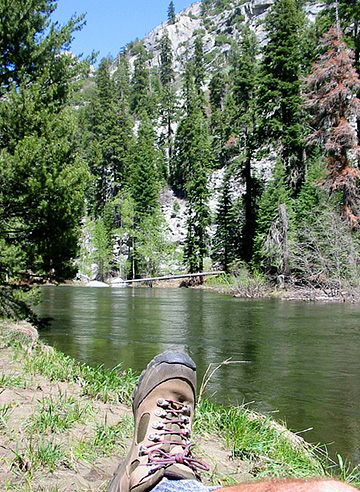I have seen Paradise . . . well, sort of. Let me explain.
A few years ago my wife and I were camping in Kings Canyon National Park, a deep valley in the Sierra Nevada mountains of California. On the first morning of our stay, we packed a lunch and headed off along a trial that ran beside the South Fork of the Kings River. As we meandered through the pine and cedar forest, the trail gradually climbed up the narrowing canyon. After about four miles of uphill hiking we came to upon the dazzling cascades of Mist Falls. Suitably named, the falls cooled us with the mist that showered our trail. Clambering up the trail that had become quite steep, we finally arrived at the top of the falls.
Before us lay an exquisite sight. The valley above the falls became wider and flatter. The river that rushed through the gorge below was now placid as it flowed gently between verdant forests and blooming meadows. The granite walls of the glacier-carved valley shone in the bright Sierra sunlight. Locating a perfect spot for our picnic lunch, Linda and I drank in the tranquility of our heavenly realm. No wonder it was called “Paradise Valley.” And, no wonder that peace should pervade a place called “paradise.” (Photo: Relaxing in Paradise Valley)
 Paradise and peace: these two ideas are inseparable. I can’t imagine being in paradise that was anything other than peaceful. Moreover, when I think of experiencing real peace, that sounds like paradise to me. I know lots of people who would readily agree: the mom with young children who cherishes those rare moments when her kids are asleep and the house is quiet; the harried manager who takes an extra minute in the stillness of his car just to calm his soul after work; the high school student whose jammed schedule allows no time for sleep. Then there are folks who find themselves in heartbreaking conflicts with family or friends. Others experience a war on the inside as old fears and wounds haunt them every day. Many in our world today confront life-threatening violence in their communities. Peace in relationships, in our hearts, in daily life – now that would be paradise indeed.
Paradise and peace: these two ideas are inseparable. I can’t imagine being in paradise that was anything other than peaceful. Moreover, when I think of experiencing real peace, that sounds like paradise to me. I know lots of people who would readily agree: the mom with young children who cherishes those rare moments when her kids are asleep and the house is quiet; the harried manager who takes an extra minute in the stillness of his car just to calm his soul after work; the high school student whose jammed schedule allows no time for sleep. Then there are folks who find themselves in heartbreaking conflicts with family or friends. Others experience a war on the inside as old fears and wounds haunt them every day. Many in our world today confront life-threatening violence in their communities. Peace in relationships, in our hearts, in daily life – now that would be paradise indeed.
Most of us are familiar with the Old Testament word for “peace.” It is shalom. For Hebrew speakers, shalom has a much richer and fuller significance than the English word “peace.” Whereas we sometimes limit the idea of peace to the absence of conflict, shalom includes far more. It comprises notions of wholeness, completeness, soundness, and prosperity. The Psalmist sings, “Those who are gentle and lowly will possess the land; they will live in abundant peace” (Ps 37:11, literal translation). God’s promise of blessing to Israel through Isaiah uses similar language: “I will make your towers of sparkling rubies and your gates and walls of shining gems. I will teach all your citizens, and their peace will be great” (Isa 54:12-13, literal translation).
In the Old Testament, peace is also inseparable from righteousness and justice. These latter concepts are embodied in one Hebrew word that connotes right-relationship between two or more parties. This word is usually translated as “righteousness,” referring not only to doing morally correct deeds, but also to living rightly in relationship with others. Righteousness is also closely connected to justice, because the righteous person acts with justice in the civil or judicial sphere. The necessary link between righteousness and peace can be seen, for example, in Isaiah’s vision of a future day when a righteous king will reign over Israel and God’s Spirit will be poured out upon the people:
Then the wilderness will become a fertile field, and the fertile field will become a lush and fertile forest. Justice will rule in the wilderness and righteousness in the fertile field. And this righteousness will bring peace. Quietness and confidence will fill the land forever (Isa 32:15-17, NLT).
With a similar picture in mind, the Psalmist looks forward to a time with God’s salvation pervades the nation. It that day one will proclaim, “Unfailing love and truth have met together. Righteousness and peace have kissed!” (Psa 85:10).
In biblical perspective, therefore, the absence of conflict is only the bare beginning of peace. True peace includes personal wholeness, corporate righteousness, political justice, and prosperity for all creation. That’s exactly the way God intended things to be when he created his garden, his paradise. (Our word “paradise” comes from a Greek word that described the elegant parks of ancient Persian kings.) Perhaps no term better describes God’s perfect paradise than “peaceful,” a world full of wholeness, righteousness, justice, and prosperity.
The creation accounts in Genesis reveal the peaceful dimensions of God’s masterpiece. Not only do we find no evidence of conflict in the first chapter of Genesis, but also we sense that all relationships are sound as creation works together to fulfill God’s purposes. That same picture is confirmed and clarified in Genesis 2. There creation is pictured as a garden both beautiful to the eyes and filled with delicious food (Gen 2:8-9). Adam will work in the garden and it will produce abundant fruit with minimal toil. The right-relationship between God and Adam is seen in God’s generous provision for Adam, in God’s ongoing care for him, and in his complete obedience to God’s command (Gen 2:18-25). When the Lord creates a female companion for the man, the relationship between the two people is also full of peace. They share intimate fellowship with each other, naked in body and soul, completely without shame (Gen 2:25). In their lack of shame we also sense the peace that fills their own souls.
The Old Testament conception of peace is closely related to the New Testament notion of fellowship. In my book, After “I Believe,” I showed that the New Testament Greek word for fellowship, koinonia, might better be translated as “intimate fellowship.” When we have peace with God, we live in intimate fellowship with him. Similarly, peaceful (peace-full) human relationships are also characterized by koinonia. What could be more intimate than the fellowship shared by the man and the woman in Genesis 2? Peace, intimate fellowship, righteousness, justice, these interrelated qualities characterize God’s perfect paradise. They reveal God’s intentions for how we are to live. In a nutshell, we’re to live in peace.
This post is part of a series: Seeking the Peace of Christ: Peacemaking and Christianity. You can read or link to the series by clicking on the series title.

